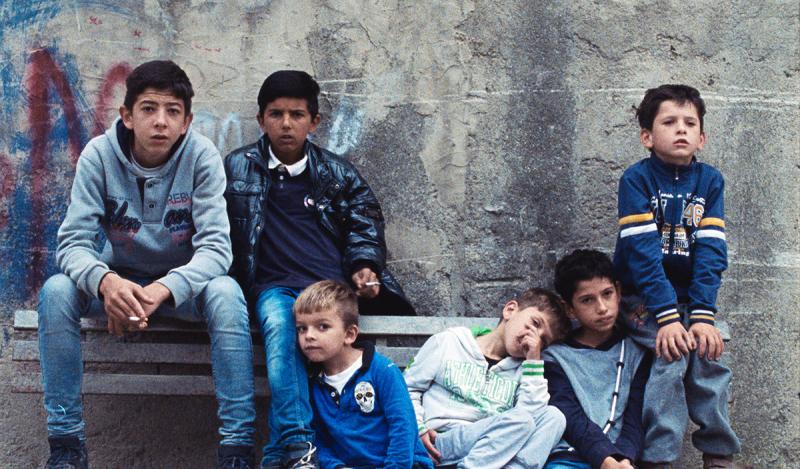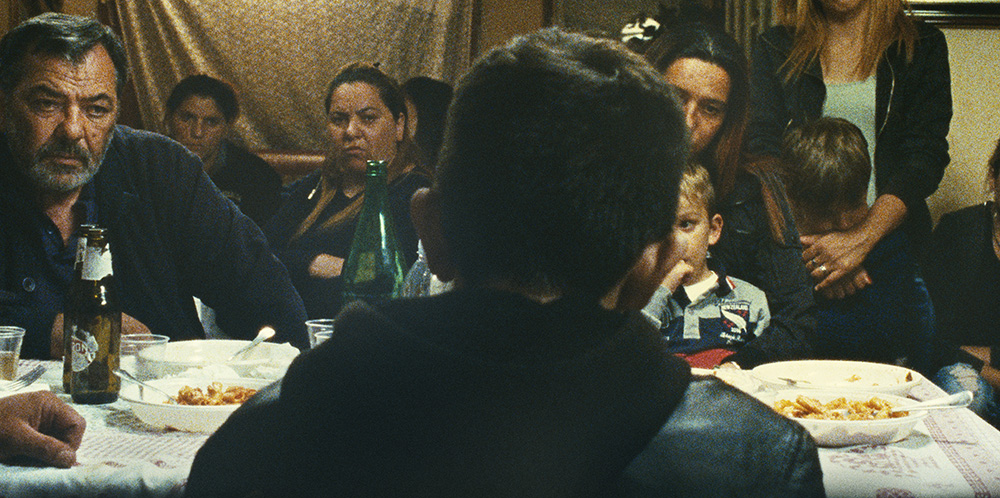The Ciambra review - supremely effective storytelling | reviews, news & interviews
The Ciambra review - supremely effective storytelling
The Ciambra review - supremely effective storytelling
'This Is England' meets 'Gomorrah' in one boy’s passage into manhood

The Ciambra is a wonderful and subtle piece of filmmaking. Director/writer Jonas Carpignano captures the genuine heart and fire of family relationships with an amateur cast of relatives, led by the magnetic young Pio Amato.
Pio is 14-years-old, living with his large family in the Romani community known as the Ciambra, in south Italy. Life here is tough – the electricity is stolen, and money is made by hijacking cars for ransom. Age works differently here, with establishing shots showing children drinking alcohol and toddlers smoking. Pio may be a teenager, but he feels ready to be a man.
His opportunity arises when the men of the house are arrested. The family’s left with a big bill, no income, and the mafia breathing down their neck, so Pio decides to start earning some cash. With the help of his older friend Ayiva, from the African immigrant community, Pio proves quite the entrepreneur, but soon finds adult life isn’t as simple and fun as it looks.

Pio’s journey, although more illegal than most, is immediately familiar. That age when you want to be taken seriously and respected, even if your actions don't call for it. He reveres his older brother’s lifestyle of stealing and clubbing, but he’s driven by more than carnal lust and greed; he feels a sense of responsibility to both his immediate family and his traveller ancestry.
Without ever spelling it out, director Jonas Carpignano paints a vivid picture of adolescent confusion. The pride of making money, the fear of being caught red-handed, the heartbreak of disappointing your family. For much of the film, the camera is a passenger to Pio’s missions, only occasionally giving way to gorgeous dreamlike sequences that emphasise the weight of familial responsibility. There’s a confidence in Carpignano’s storytelling, with a lot of trust placed in the inexperienced cast.
It’s a work of fiction, but the lines are heavily blurred. Carpignano first met the Amato family after a crew car was stolen during filming of his debut Mediterranea. He became enthralled by the energy and lives of the Ciambra, and later cast Pio and his family as the stars of his next feature. Their performances are wonderfully understated, clearly untrained but grounded in truth. Pio tells a story in his eyes alone, determination and vulnerability carried in a look; there’s a career ahead of him, should he choose to leave the Ciambra life.
Set pieces and choice conversations build to an unexpected, bittersweet denouement. At times, it feels like the story is treading water, but foundations are laid for an ending that’s as poignant as it is modest. All the factions - the Romani gypsies, the African immigrants, the Mafiosi - believe they're above each other, but the film demonstrates we all share the same drives, the same loyalties, and the same inevitable loss of childhood.
rating
Explore topics
Share this article
The future of Arts Journalism
You can stop theartsdesk.com closing!
We urgently need financing to survive. Our fundraising drive has thus far raised £49,000 but we need to reach £100,000 or we will be forced to close. Please contribute here: https://gofund.me/c3f6033d
And if you can forward this information to anyone who might assist, we’d be grateful.

Subscribe to theartsdesk.com
Thank you for continuing to read our work on theartsdesk.com. For unlimited access to every article in its entirety, including our archive of more than 15,000 pieces, we're asking for £5 per month or £40 per year. We feel it's a very good deal, and hope you do too.
To take a subscription now simply click here.
And if you're looking for that extra gift for a friend or family member, why not treat them to a theartsdesk.com gift subscription?
more Film
 The Mastermind review - another slim but nourishing slice of Americana from Kelly Reichardt
Josh O'Connor is perfect casting as a cocky middle-class American adrift in the 1970s
The Mastermind review - another slim but nourishing slice of Americana from Kelly Reichardt
Josh O'Connor is perfect casting as a cocky middle-class American adrift in the 1970s
 Springsteen: Deliver Me From Nowhere review - the story of the Boss who isn't boss of his own head
A brooding trip on the Bruce Springsteen highway of hard knocks
Springsteen: Deliver Me From Nowhere review - the story of the Boss who isn't boss of his own head
A brooding trip on the Bruce Springsteen highway of hard knocks
 The Perfect Neighbor, Netflix review - Florida found-footage documentary is a harrowing watch
Sundance winner chronicles a death that should have been prevented
The Perfect Neighbor, Netflix review - Florida found-footage documentary is a harrowing watch
Sundance winner chronicles a death that should have been prevented
 Blu-ray: Le Quai des Brumes
Love twinkles in the gloom of Marcel Carné’s fogbound French poetic realist classic
Blu-ray: Le Quai des Brumes
Love twinkles in the gloom of Marcel Carné’s fogbound French poetic realist classic
 Frankenstein review - the Prometheus of the charnel house
Guillermo del Toro is fitfully inspired, but often lost in long-held ambitions
Frankenstein review - the Prometheus of the charnel house
Guillermo del Toro is fitfully inspired, but often lost in long-held ambitions
 London Film Festival 2025 - a Korean masterclass in black comedy and a Camus classic effectively realised
New films from Park Chan-wook, Gianfranco Rosi, François Ozon, Ildikó Enyedi and more
London Film Festival 2025 - a Korean masterclass in black comedy and a Camus classic effectively realised
New films from Park Chan-wook, Gianfranco Rosi, François Ozon, Ildikó Enyedi and more
 After the Hunt review - muddled #MeToo provocation
Julia Roberts excels despite misfiring drama
After the Hunt review - muddled #MeToo provocation
Julia Roberts excels despite misfiring drama
 Ballad of a Small Player review - Colin Farrell's all in as a gambler down on his luck
Conclave director Edward Berger swaps the Vatican for Asia's sin city
Ballad of a Small Player review - Colin Farrell's all in as a gambler down on his luck
Conclave director Edward Berger swaps the Vatican for Asia's sin city
 London Film Festival 2025 - Bradley Cooper channels John Bishop, the Boss goes to Nebraska, and a French pandemic
... not to mention Kristen Stewart's directing debut and a punchy prison drama
London Film Festival 2025 - Bradley Cooper channels John Bishop, the Boss goes to Nebraska, and a French pandemic
... not to mention Kristen Stewart's directing debut and a punchy prison drama
 London Film Festival 2025 - from paranoia in Brazil and Iran, to light relief in New York and Tuscany
'Jay Kelly' disappoints, 'It Was Just an Accident' doesn't
London Film Festival 2025 - from paranoia in Brazil and Iran, to light relief in New York and Tuscany
'Jay Kelly' disappoints, 'It Was Just an Accident' doesn't
 Iron Ladies review - working-class heroines of the Miners' Strike
Documentary salutes the staunch women who fought Thatcher's pit closures
Iron Ladies review - working-class heroines of the Miners' Strike
Documentary salutes the staunch women who fought Thatcher's pit closures
 Blu-ray: The Man in the White Suit
Ealing Studios' prescient black comedy, as sharp as ever
Blu-ray: The Man in the White Suit
Ealing Studios' prescient black comedy, as sharp as ever

Add comment